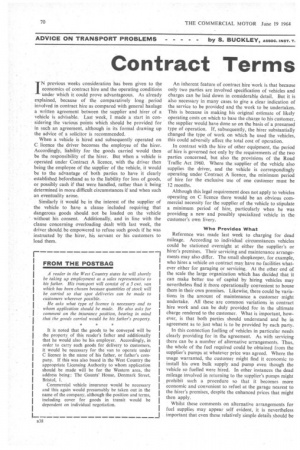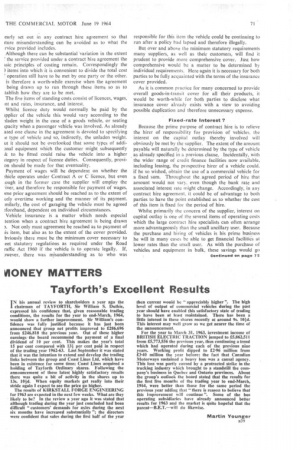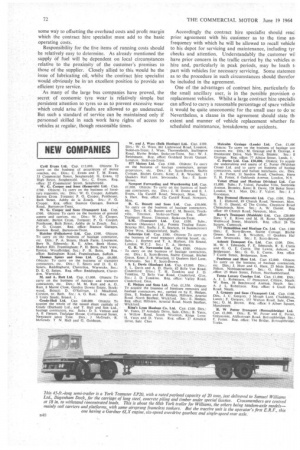Contract Terms
Page 72

Page 73

Page 74

If you've noticed an error in this article please click here to report it so we can fix it.
ADVICE ON TRANSPORT PROBLEMS by S. BUCKLEY, ASSOC. INST. T.
IN previous weeks consideration has been given to the economics of contract hire and the operating conditions • under which it could prove advantageous. As already explained, because of the comparatively long period involved in contract hire as compared with general haulage a written agreement between the supplier and hirer of a vehicle is advisable. Last week, I made a start in considering the various points which should be provided for in such an agreement, although in its formal drawing up the advice of a solicitor is recommended.
When a vehicle is hired and subsequently operated on C licence the driver becomes the employee of the hirer. Accordingly, liability for the goods carried would then be the responsibility of the hirer. But when a vehicle is operated under Contract A licence, with the driver then being the employee of the supplier of the vehicle, it would be to the advantage of both parties to have it clearly established _beforehand as to the liability for loss of goods, or possibly cash if that were handled, rather than it being determined in more difficult circumstances if and when such an eventuality arose.
Similarly it would be in the interest of the supplier of the vehicle to have a clause included requiring that dangerous goods should not be loaded on the vehicle without his consent. Additionally, and in line with the clause concerning overloading dealt with last week, the driver should be empowered to refuse such goods if he was instructed by the hirer, his servant or his customers to load them. An inherent feature of contract hire work is that because only two parties are involved specification of vehicles and charges can be laid down in considerable detail. But it is also necessary in many cases to give a clear indication of the service to be provided and the work to be undertaken. This is because in making his original estimate of likely operating costs on which to base the charge to his customer, the supplier would have done so on the basis of a presumed type of operation. If, subsequently, the hirer substantially changed the type of work on which he used the vehicles, this could adversely affect the total cost of operation.
In contrast with the hire of other equipment, the period of hire is governed not only by the requirements of the two parties concerned, but also the provisions of the Road Traffic Act 1960. Where the supplier of the vehicle also supplies the driver, and the vehicle is correspondingly operating under Contract A licence, the minimum period of hire for the exclusive use of one customer must be 12 months.
Although this legal requirement does not apply to vehicles operating on C licence there would be an obvious commercial necessity for the supplier of the vehicle to stipulate a minimum period of hire, particularly when he was providing a new and possibly specialized vehicle in the customer's own livery.
Who Provides What
Reference was made last week to charging for dead mileage. According to individual circumstances vehicles could be stationed overnight at either the supplier's or hirer's premises. Their servicing and maintenance arrangements may also differ. The small shopkeeper, for example, who hires a vehicle on contract may have no facilities whatever either for garaging or servicing. At the other end of the scale the large organization which has decided that it can make better use of capital by hiring vehicles may nevertheless find it More operationally convenient to house them in their own premises. Likewise, there could be variations in the amount of maintenance, a customer might undertake. All these are common variations in contract hire work and can be duly provided for in the ultimate charge rendered to the customer. What is important, however, is that both parties should understand and be in agreement as to just what is to be provided by each party.
In this connection fuelling of vehicles in particular needs clearly providing for in the agreement. As with servicing there can be a number of alternative arrangements. Thus, the whole of the fuel required could be obtained from the supplier's pumps at whatever price was agreed. Where the usage warranted, the customer might find it economic to install his own bulk supply and pump even though the vehicle so fuelled were hired. In other instances the dead mileage involved in returning to the supplier's pumps might prohibit such a procedure so that it becomes more economic and convenient to refuel at the garage nearest to the hirer's premises, despite the enhanced prices that might then apply.
Whilst these comments on alternative arrangements for fuel supplies may appear self evident, it is nevertheless important that even these relatively simple details .should be
early set out in any contract hire agreement so that Mire misunderstanding can be avoided as to what the rvice provided includes.
Although there can be substantial 'variation in the extent ' the service provided under a contract hire agreement the isic principles of costing remain. Correspondingly the itemS into which it is convenient to divide the total cost operation still have to be met by one party or the other. is therefore a worth-while exercise when the agreement being drawn up to run through these items so as to tablish how they are to be met.
The five items of standing costs consist of licences, wages, nt and rates, insurance, and interest.
Whilst licence duty would normally be paid by the Lpplier of the vehicle this would vary according to the lladen weight in the case of a goods vehicle, or seating Lpacity when a passenger vehicle was involved. As already ated one clause in the agreement is devoted to specifying Le type of vehicle and so, indirectly, the unladen weight. ut it should not be overlooked that some types of addianal equipment which the customer might subsequently ;k to be fitted could raise the vehicle into a higher Ltegory in respect of licence duties. Consequently, provion should be made for that eventuality.
Payment of wages will be dependent on whether the :hide operates under Contract A or C licence, but even ,ough in the former case the supplier will employ the -iver, and therefore be responsible for payment of wages, ime prior agreement should be reached as to the extent of cely overtime working and the manner of its payment. milady, the cost of garaging the vehicle must be agreed :forehand, dependent on individual circumstances.
Vehicle insurance is a matter which needs especial tention when a contract hire agreement is being drawn ). Not only must agreement be reached as to payment of is item, but also as to the extent of the cover provided. bviously there must be the minimum cover necessary to eet statutory regulations as required under the Road raffle Act 1960 if the vehicle is to operate legally. If, )wever, there was misunderstanding as to who was
responsible for this item the vehicle could be continuing to run after a policy had lapsed and therefore illegally.
But over and above the minimum statutory requirements many suppliers, as well as their customers, will find it prudent to provide more comprehensive cover. Just how comprehensive would be a matter to be determined by individual requirements. Here again it is necessary for both parties to be fully acquainted with the terms of the insurance cover provided.
As it is common practice for many concerned to provide overall goods-in-transit cover for all their products, it would be worth-while for both parties to disclose what insurance cover already exists with a view to avoiding possible duplication and therefore unnecessary expense,
Fixed-rate Interest ?
Because the prime purpose of contract hire is to relieve the hirer of responsibility for -provision of vehicles, the interest on the capital outlay thereby involved will obviously be met by the supplier. The extent of the amount payable will naturally be determined by the type of vehicle as already specified in a previous clause. Incidentally, with the wider range of credit finance facilities now available, including leasing, the prospective hirer of a vehicle could, if he so wished, obtain the use of a commercial vehicle for a fixed sum. Throughout the _agreed period of hire that amount would not vary, even though the bank rate and associated interest rate might change. Accordingly, in any contract hire agreement, it could be of advantage to both parties to have the point established as to whether the cost of this item is fixed for the period of hire.
Whilst primarily the concern of the supplier, interest on capital outlay is one of the several items of operating costs which the large contract hire specialists can often arrange more advantageously than the small ancillary user. Because the purchase and hiring of vehicles is his prime business he will in many cases be able to get financial facilities at lower rates than the small user. As with the purchase of vehicles and equipment in bulk, these savings would go
some way to offsetting the overhead costs and profit margin which the contract hire specialist must add to the basic operating costs.
Responsibility for the five items of running costs should be relatively easy to determine. As already mentioned the supply of fuel will be dependent on local circumstances relative to the proximity of the customer's premises to those of the supplier. Closely allied to this would be the issue of lubricating oil, whilst the contract hire specialist would obviously be in an excellent position to provide an efficient tyre service.
As many of the large bus companies have proved, the secret of economic tyre wear is relatively simple but persistent attention to tyres so as to prevent excessive wear which could arise if faults are allowed to go undetected. But such a standard of service can be maintained only if personnel skilled in such work have rights of access to vehicles at regular, though reasonable times.
Accordingly the contract hire specialist should reac prior, agreement with his customer as to the time an frequency with which he will be allowed to recall vehicle to his depot for servicing and maintenance, including tyr checks and attention. Understandably the customer wil have prior concern in the traffic carried by the vehicles a hire and, particularly in peak periods, may be loath t part with vehicles for necessary servicing. Some statemen as to the procedure in such circumstances should therefor be included in the agreement.
One of the advantages of contract hire, particularly fo the small ancillary user, is in the possible provision o replacement vehicles. Whilst a large contract hire specialis can afford to carry a reasonable percentage of spare vehicle it would be quite uneconomic for the small user to do sc Nevertheless, a clause in the agreement should state th, extent and manner of vehicle replacement whether fo scheduled maintenance, breakdowns or accidents.




















































































































